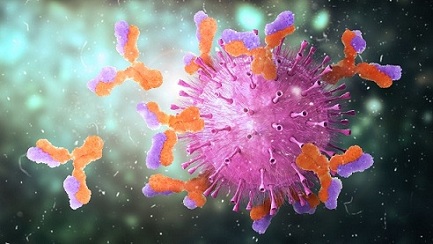BREAKING! Study Warns That About 20 Percent Of Individuals Will Not Develop Immune Protection To SARS-CoV-2 Despite Recovery Or Even Vaccination!
Source: COVID-19 Research Aug 31, 2021 4 years, 5 months, 2 weeks, 2 days, 5 hours, 27 minutes ago
COVID-19 Research: A new study published in the peer reviewed journal:
Allergy (The European Journal of Allergy and Clinical Immunology) warns that about 20% of individuals who have recovered from COVID-19 or even having received full vaccine doses will not develop immune protection against the SARS-CoV-2 coronavirus!
https://onlinelibrary.wiley.com/doi/10.1111/all.15066

According to study team from Medical University of Vienna-Austria, the determinants of successful humoral immune response to the SARS-CoV-2 virus are of critical importance for the design of effective vaccines and the evaluation of the degree of protective immunity conferred by exposure to the virus. As novel variants emerge, understanding their likelihood of suppression by population antibody repertoires has become increasingly important.
The study team analyzed the SARS-CoV-2 polyclonal antibody response in a large population of clinically well-characterized patients after mild and severe COVID-19 using a panel of microarrayed structurally folded and unfolded SARS-CoV-2 proteins, as well as sequential peptides, spanning the surface spike protein (S) and the receptor-binding domain (RBD) of the virus.
The study findings shewed that the S- and RBD-specific antibody responses were dominated by immunoglobulin G (IgG), mainly IgG
1, and directed against structurally folded S and RBD and three distinct peptide epitopes in S2. The virus-neutralization activity of patients´ sera was highly correlated with IgG antibodies specific for conformational but not sequential RBD epitopes and their ability to prevent RBD binding to its human receptor angiotensin-converting enzyme 2 (ACE2).
Surprisingly, about twenty percent of patients selectively lacked RBD-specific IgG. Only immunisation with folded, but not with unfolded RBD, induced antibodies against conformational epitopes with high virus-neutralizing activity. Conformational RBD epitopes required for protection do not seem to be altered in the currently emerging virus variants.
The study team stresses that these study findings are fundamental for estimating the protective activity of antibody responses after natural infection or vaccination and for the design of vaccines, which can induce high levels of SARS-CoV-2-neutralizing antibodies conferring sterilizing immunity.
Allergist and immunologist Dr Rudolf Valenta from the Center for Pathophysiology, Infectiology and Immunology at MedUni Vienna told Thailand Medical News, “Around 20% of those who have recovered from COVID-19 fail to develop immune protection against SARS-CoV-2. The study found that the crucial immune protection that prevents the virus from docking and invasion of the body's cells only occurs when a person is able to form specific antibodies against the folded receptor binding domain (RBD) of the spike protein. This docking site does not change significantly with mutations of the virus. However, some people are unable to do this so for various reasons. An antigen-based vaccine targeting RBD could provide a solution, but such a vaccine is not yet available.”
The
COVID-19 Research team led by study directors Dr Rudolf Valenta and Dr Winfried F. Pickl from MedUni Vienna's Center for Pathophysiology, Infectiology and Immunology investigated the immune status of an initial cohort of patients who had recovered from a mild course of COVID-19.
One of the key findings at the time was that a significant proportion of infected patients were unable to form protective antibodies against SARS-CoV-2.
The study team analyzed the antibody response of a larger cohort following mild and severe SARS-CoV-2 infection. The study used a microarray (chip) technology developed at MedUni Vienna, in which a large number of viral antigens are applied to a microscopic chip by a robotic spotting machine. In addition, overlapping protein fragments (peptides) of these viral antigens were fixed to onto the chip, covering the entire spike protein on which the receptor binding domain (RBD) is located. This is the domain with which the SARS-CoV-2 virus binds to the ACE2 receptor of human cells.
The study team expected to see an immune response to the peptides, but antibodies were exclusively formed against the intact, three-dimensionally folded spike protein. Proteins acquire their three-dimensional shape through the physically induced process of protein folding.
Significantly, it now appears that the SARS-CoV-2 virus needs the three-dimensionally folded protein to dock onto the body's cells. Only an antibody response against the folded protein, but not against parts of it, protects against infection.
Hence the findings lead to one major conclusion-“
High antibody levels against the folded spike protein, and especially against the RBD it contains, prevent the virus from binding to human cells. However, if someone is unable to form antibodies against the folded RBD, the person will not be well protected”
The study team also showed that only the folded RBD, but not unfolded RBD, generates immune protection upon immunization.
Because the genetic vaccines currently in use mimic infection, it is possible that vaccination breakthroughs could be explained by the failure to develop antibodies against folded RBD.
The study team concluded, “Individuals who sufficiently form antibodies against folded RBD are protected against SARS-CoV-2 infections. These antibodies are readily measurable in the blood with neutralization tests. Unfortunately, 20% of those who have recovered from COVID-19 and likely those who have been vaccinated fail to produce these antibodies.
Dr Valenta further added, "We urgently need to develop an RBD-based antigen vaccine which is engineered to overcome the RBD non-responsiveness. This vaccine would be highly effective in inducing RBD-specific and thus neutralizing antibodies, whose levels could be kept high by booster vaccinations. In this way we could also to exploit the "Achilles' heel" of the virus, whose docking site does not change significantly with mutations.”
For the latest
COVID-19 Research, keep on logging to Thailand Medical News.
